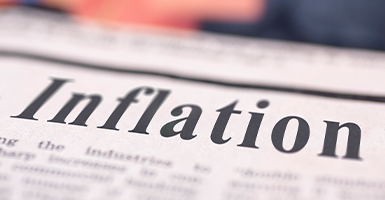Inflation might sound like another bombastic word from the financial industry, but it is simple to understand as much as it is complicated. Inflation is a decrease in the purchasing power of money, reflected in a general increase in the prices of goods and services in an economy. Even simpler, it’s when prices go up in general.
During one of MeDirect’s webinars, Mike Coop, Chief Investment Officer of Morningstar fund house discussed the reality of inflation and what one should do about it. MeDirect Bank organises a series of webinars held for free with guest speakers from international, well-known fund houses.
Inflation really depends on the trends and demands at that point in time. These do can change as life goes on. Let’s say there’s a new trend of baking banana bread (something we saw during the start of the pandemic), suddenly everyone’s buying bananas and bananas prices go up! On the other hand, another fruit might take the backseat and its price might go down, these fluctuations happen often.
Inflation happens when the average prices of practically everything goes up. This includes houses, cars, food, clothes, so on and so forth and in order for someone to start affording the new increased prices, salaries have to increase too.
As discussed during the webinar held by MeDirect on the 2nd of December 2021, we’ve been living in an ideal low-and-slow level of inflation in the past recent years. Prices were going up around 2% a year. One has to take into consideration that housing and health care had a bigger increase, while gadgets became cheaper, so the bigger picture has been quite balanced.
So why has the end of 2021, and the beginning of 2022 bombarded us with the word ‘inflation’? This is for a variety of reasons that are mainly stemming from the pandemic – the global economy finds itself in a rigorous change at the moment. As Mr Coop stated during the medirectalk, inflation was mainly noticed in the American and European continents but not so much in Asia. “Graphs show that in Europe we are expecting an average of 2.9% inflation over a 5 year period. It also goes to show that up till now consumers aren’t changing their behaviour in relationship with inflation” stated Morningstar’s Chief Investment Officer.
Following the abrupt spread of Covid-19 during the spring of 2020, the global economy was hit hard. Factories were shut down, people stopped traveling and going out, aeroplanes were grounded and millions of people around the world were made redundant, practically overnight. It was the sharpest economic contraction on record. By summer 2020, demand started picking up again. Governments started giving a number of subsidies and stimuli and people started shopping again. The demand rose again, but supply couldn’t bounce back so easily. This is when inflation happens.
Inflation is often described as ‘too much money chasing too few goods’, and that is exactly what happened. Supply came to a halt for a period of time and could not catch up with the rejuvenated demand. With a sudden increase in demand and a limited supply, naturally, prices had to go up. All raw materials got scarce, transporting was stopped, shipping was halted and the whole supply chain got clogged.
And what’s next? Governments, policymakers and business leaders are working incessantly to ease up the supply chain, back to how it was pre-pandemic. Everyone seems to be pulling the same rope into a post-pandemic era to create more stability and reassurance. The way forward depends on a number of factors, namely on how central banks respond and on other Covid variants that might impact the world. As Coop concluded in his webinar, history suggests a low probability of moving from a low to a high inflation era and Morningstar believes that the majority of inflationary pressures are more transient than permanent.
Get to know more about the latest in the financial world by joining the free webinars by MeDirect Bank that can be accessed online from the comfort of your couch.
MeDirect Disclaimers:
MeDirect Bank (Malta) plc, is licensed to undertake the business of banking in terms of the Banking Act (Cap. 371) and investment services under the Investment Services Act (Cap. 370).

